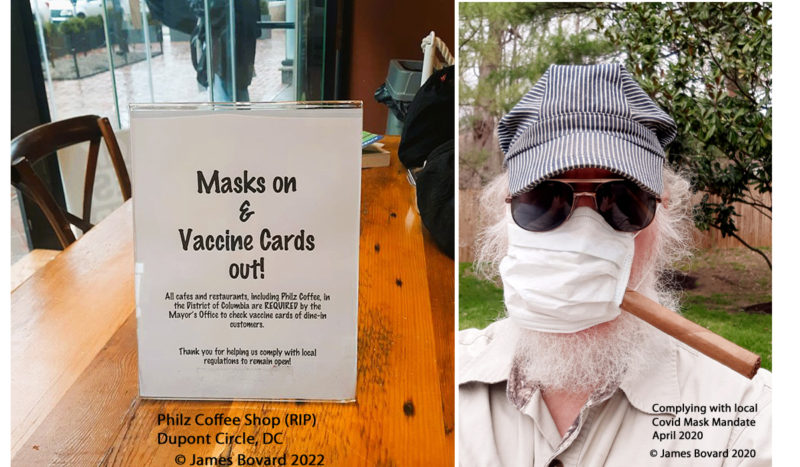Category Archive: 6b.) Mises.org
Lincoln’s New Deal
In Frank W. Taussig’s The Tariff History of the United States, he describes the mass of unprecedented financial legislation that took place, which likely would not have occurred absent the context of the war,Probably no country has seen, in so short a time, so extraordinary a mass of financial legislation. A huge national debt was accumulated; the mischievous expedient of an inconvertible paper currency was resorted to; a national banking system...
Read More »
Read More »
The Great Murray Rothbard
Murray Rothbard was the chief architect of modern anarcho-capitalism, an uncompromising vision of a stateless society rooted in private property and voluntary association. He built upon classical liberal thought, particularly the ideas of John Locke and the individualist anarchism of 19th-century thinkers like Lysander Spooner and Benjamin Tucker. However, unlike his predecessors, Murray fused these ideas with the Austrian School of economics,...
Read More »
Read More »
Closing Signs Are Signs of the Times
It was not long ago when signs for “Help Wanted” seemed to be in every store window. That is starting to be replaced in 2024 and 2025 with “Store Closing” signs. This switcheroo tells us volumes about how people and the economy are adjusting to the Fed’s money printing business. While the government and the wealthy elite benefit from the money printing, consumers and workers only seem to suffer.I do feel sorry for the rank-and-file workers in the...
Read More »
Read More »
Tariffs Also Tax Capital, Not Just Consumption
In a recent column, Paul Craig Roberts wrote that tariffs not only made international trade possible, but that they were merely a tax on consumption and were neutral elsewhere—and should be much-preferred to income taxes. He wrote:Trump sees tariffs in a different way than indoctrinated free-market economists. Tariffs don’t prevent trade. They ensure that countries have something with which to trade. Moreover, tariffs are a tax on consumption, not...
Read More »
Read More »
Gold, Money, and the Nation-State
What is the Mises Institute?
The Mises Institute is a non-profit organization that exists to promote teaching and research in the Austrian School of economics, individual freedom, honest history, and international peace, in the tradition of Ludwig von Mises and Murray N. Rothbard. Non-political, non-partisan, and non-PC, we advocate a radical shift in the intellectual climate, away from statism and toward a private property...
Read More »
Read More »
Covid: The New, “New Deal” Revisionism Is Already Starting
As a history teacher and an economist, it never ceases to amaze me at the success of certain historical myths (in this case, defined as verifiably untrue beliefs) have come to dominate popular understanding. Often it seems that no presentation of facts to the contrary of such myths are sufficient to dislodge them.Perhaps one of the most stubborn myths—and other myths related to it—is that Roosevelt’s New Deal policies brought about economic...
Read More »
Read More »
The Struggle for Liberty: A Libertarian History of Political Thought
What is the Mises Institute?
The Mises Institute is a non-profit organization that exists to promote teaching and research in the Austrian School of economics, individual freedom, honest history, and international peace, in the tradition of Ludwig von Mises and Murray N. Rothbard. Non-political, non-partisan, and non-PC, we advocate a radical shift in the intellectual climate, away from statism and toward a private property...
Read More »
Read More »
Too Obvious to See?
The Trump-Musk assassination troops going through the federal bureaucracy will eventually arrive at an oddball entity called the Federal Reserve. It is and isn’t many things, which if confusion is your sport, is part of its charm.It is an “inflation fighter” whose main purpose is creating inflation. On rare occasions a Fed member or even the Chairman will state in plain language what the Federal Reserve does—“print money”—but most people seem to...
Read More »
Read More »
The Madness of Presidential Tariffs
Extraordinary Popular Delusions and the Madness of Crowds is an early study of crowd psychology by Scottish journalist Charles Mackay, first published in 1841 under the title Memoirs of Extraordinary Popular Delusions. The book was published in three volumes: “National Delusions”, “Peculiar Follies,” and “Philosophical Delusions.”The first three chapters address economic events to include:The Mississippi SchemeThe South Sea BubbleThe Tulip ManiaThe...
Read More »
Read More »
Empire as the Price of Bureaucracy
William F. Buckley, Jr. wrote in 1952, “We have to accept Big Government for the duration [of the Cold War]—for neither an offensive nor a defensive war can be waged . . . except through the instrument of a totalitarian bureaucracy within our shores.” Since, the conservative establishment has sacrificed the nation at the altar of defeating the latest boogeyman abroad. They have accepted bureaucracy in place of markets, technocracy in place of...
Read More »
Read More »
Who Gets the Blame for the Upcoming Recession?
Over the weekend, President Trump made headlines for refusing, on two occasions, to rule out the possibility that the US will experience a recession this year. The comments came days after the Atlanta Fed announced it now projects GDP to fall by nearly three percent in the first quarter of this year.Those developments, paired with the recent stock market decline set off by the market’s reaction to Trump’s tariff plans, have many political opponents...
Read More »
Read More »
Tho Bishop on Trump, Tariffs, and America’s Rigged Economy
What is the Mises Institute?
The Mises Institute is a non-profit organization that exists to promote teaching and research in the Austrian School of economics, individual freedom, honest history, and international peace, in the tradition of Ludwig von Mises and Murray N. Rothbard. Non-political, non-partisan, and non-PC, we advocate a radical shift in the intellectual climate, away from statism and toward a private property...
Read More »
Read More »
Who Gets the Blame for the Upcoming Recession?
What is the Mises Institute?
The Mises Institute is a non-profit organization that exists to promote teaching and research in the Austrian School of economics, individual freedom, honest history, and international peace, in the tradition of Ludwig von Mises and Murray N. Rothbard. Non-political, non-partisan, and non-PC, we advocate a radical shift in the intellectual climate, away from statism and toward a private property...
Read More »
Read More »
State to State Secession Movements
Episode 2604 of The Tom Woods Show released on February 8, 2025, entitled, “Is the U.S. Headed for Breakup (in the Long Run)?” interviewed Ryan McMaken, Senior Editor of The Mises Institute. The main topic was the breakup of the United States in the long run, also called secession.One type of secession active in 2025 is when one or more rural counties seek to secede from the current state to join a neighboring state. Many residents of the seceding...
Read More »
Read More »
Are Economic Progress and Cultural Values Mutually Exclusive?
Economic progress is sometimes seen as inimical to the bonds of “family, faith, and flag” that many people value. Many place such a high priority on their way of life within their own neighborhoods or communities, that losing their traditional cultural values in exchange for economic progress may not be a price they would wish to pay. This is poignantly expressed by John Slaughter, in his article “How Does it Profit the South,” as “a tinge of...
Read More »
Read More »
Spending Cuts Won’t Weaken the US Economy. They Will Strengthen It.
The Federal Reserve Bank of Atlanta’s GDPNow model projection for real GDP growth in the first quarter of 2025 (Q1 2025) is now showing a slump to -1.5 percent. This marks a significant downward revision from the previous estimate of 2.3 percent on February 19, 2025.Such an enormous decline is strange. How did we go from +2.3 percent to -1.5 percent in less than a month? That kind of collapse in an economy as large as the United States is...
Read More »
Read More »
Foreign Aid, Reparations, and Economic Growth
David Lammy, the UK’s Foreign Secretary, has lent his voice to the growing call for reparations for former colonies in the British West Indies. Advocates argue that financial compensation would provide a much-needed economic boost to these nations, helping them overcome the burden of low economic growth. However, this view is fundamentally flawed. Akin to foreign aid, reparations are unlikely to catalyze genuine economic development. Decades of...
Read More »
Read More »
Why the Government’s Gold Reserve Is a Bad Thing
What is the Mises Institute?
The Mises Institute is a non-profit organization that exists to promote teaching and research in the Austrian School of economics, individual freedom, honest history, and international peace, in the tradition of Ludwig von Mises and Murray N. Rothbard. Non-political, non-partisan, and non-PC, we advocate a radical shift in the intellectual climate, away from statism and toward a private property...
Read More »
Read More »
Five Years Later, We Remember How Politicians Unleashed Covid Tyranny
Five years ago, politicians and bureaucrats went berserk and pointlessly ravaged Americans’ freedom. The Covid-19 pandemic provided the pretext to destroy hundreds of thousands of businesses, padlock churches, close down schools, and effectively place hundreds of millions of Americans under house arrest. Despite all the forced sacrifices, most Americans contracted covid and more than a million were listed as dying from the virus.“Pandemic Security...
Read More »
Read More »
Is Amazon a Union-Busting Leviathan?
What is the Mises Institute?
The Mises Institute is a non-profit organization that exists to promote teaching and research in the Austrian School of economics, individual freedom, honest history, and international peace, in the tradition of Ludwig von Mises and Murray N. Rothbard. Non-political, non-partisan, and non-PC, we advocate a radical shift in the intellectual climate, away from statism and toward a private property...
Read More »
Read More »






















